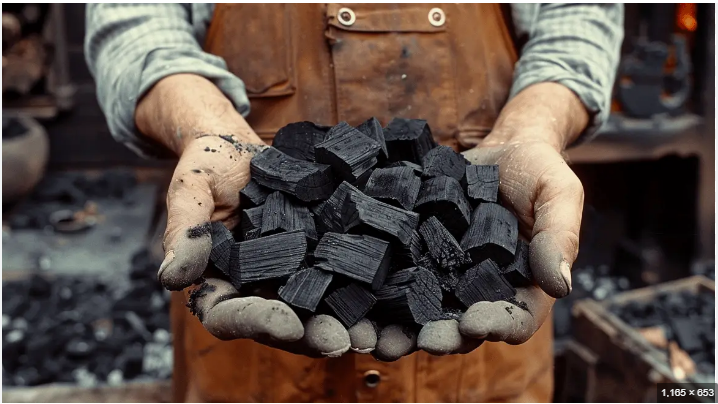
Charcoal production is a significant contributor to deforestation and forest degradation, particularly in developing countries. The production of charcoal, which is often used as a source of energy for cooking and other domestic purposes, has severe effects on forest reserves and the country’s economy.
Effects on Forest Reserves
1. Deforestation and Forest Degradation: Charcoal production leads to widespread deforestation and forest degradation, as trees are cut down to produce charcoal. This results in the loss of biodiversity, soil erosion, and increased greenhouse gas emissions.
2. Loss of Ecosystem Services: Forests provide essential ecosystem services, including air and water filtration, soil conservation, and climate regulation. The destruction of forests for charcoal production disrupts these ecosystem services, leading to negative impacts on the environment and human well-being.
3. Soil Degradation: The removal of trees for charcoal production leads to soil degradation, as the soil is no longer protected by tree roots. This results in soil erosion, reduced fertility, and decreased agricultural productivity.
Implications on the Country’s Economy
1. Loss of Revenue: The destruction of forests for charcoal production results in the loss of revenue from sustainable forest management, ecotourism, and non-timber forest products.
2. Increased Poverty: Charcoal production often involves the exploitation of rural communities, who are forced to engage in unsustainable forest practices to meet their energy needs. This perpetuates poverty and undermines sustainable development.
3. Negative Impacts on Agriculture: The destruction of forests for charcoal production leads to soil degradation, reduced fertility, and decreased agricultural productivity. This has negative impacts on the country’s agricultural sector, leading to reduced food security and economic growth.
4. Climate Change: The production of charcoal contributes to climate change by releasing greenhouse gases, such as carbon dioxide and methane, into the atmosphere. This exacerbates climate change, leading to negative impacts on the country’s economy, environment, and human well-being.
Solutions to the Problem
1. Sustainable Forest Management: Implementing sustainable forest management practices, such as selective logging and reforestation, can help reduce the negative impacts of charcoal production on forest reserves.
2. Alternative Energy Sources: Promoting alternative energy sources, such as solar, wind, and hydroelectric power, can reduce the demand for charcoal and help mitigate the negative impacts of charcoal production on forest reserves.
3. Community-Based Forest Management: Empowering local communities to manage their forests sustainably can help reduce the negative impacts of charcoal production on forest reserves and promote sustainable development.
4. Policy and Regulatory Frameworks: Strengthening policy and regulatory frameworks to prevent deforestation and forest degradation can help mitigate the negative impacts of charcoal production on forest reserves and promote sustainable development.
Conclusion
The production of charcoal has devastating effects on forest reserves and the country’s economy. It is essential to address this issue by implementing sustainable forest management practices, promoting alternative energy sources, empowering local communities to manage their forests sustainably, and strengthening policy and regulatory frameworks. By taking these steps, we can mitigate the negative impacts of charcoal production on forest reserves and promote sustainable development.
Local Charcoal Production: Benefits and Opportunities
Charcoal production is a significant economic activity in many rural communities, providing employment and income opportunities for thousands of people. Local charcoal production, in particular, offers several benefits, including:
Benefits of Local Charcoal Production
1. Job Creation and Income Generation: Local charcoal production provides employment opportunities for rural communities, generating income and improving livelihoods.
2. Energy Access: Charcoal is a widely used energy source in many rural areas, providing access to energy for cooking, heating, and other domestic purposes.
3. Reduced Dependence on Fossil Fuels: Charcoal is a renewable energy source, reducing dependence on fossil fuels and mitigating climate change.
4. Improved Air Quality: Charcoal production can be done in a way that minimizes air pollution, improving air quality and public health.
5. Supports Sustainable Forest Management: Local charcoal production can be done in a way that supports sustainable forest management, promoting reforestation and afforestation efforts.
6. Empowers Local Communities: Local charcoal production empowers local communities, providing them with control over their natural resources and economic development.
Opportunities for Local Charcoal Production
1. Value Chain Development: Developing the charcoal value chain can create new business opportunities, improve efficiency, and increase profitability.
2. Sustainable Forest Management: Promoting sustainable forest management practices can ensure the long-term sustainability of charcoal production, while also supporting biodiversity conservation and ecosystem services.
3. Cleaner Production Technologies: Adopting cleaner production technologies can reduce the environmental impacts of charcoal production, improving air quality and reducing waste.
4. Market Development: Developing markets for charcoal can increase demand, improve prices, and provide incentives for sustainable production practices.
5. Capacity Building and Training: Providing training and capacity-building programs for charcoal producers can improve their skills, knowledge, and productivity, while also promoting sustainable production practices.
Challenges Facing Local Charcoal Production
1. Deforestation and Forest Degradation: Charcoal production is often associated with deforestation and forest degradation, which can have severe environmental and social impacts.
2. Lack of Regulation and Enforcement: The charcoal industry is often characterized by a lack of regulation and enforcement, leading to unsustainable production practices and environmental degradation.
3. Limited Access to Markets and Finance: Charcoal producers often face challenges in accessing markets and finance, which can limit their ability to invest in sustainable production practices and improve their livelihoods.
4. Climate Change and Energy Transition: The charcoal industry is vulnerable to climate change and energy transition, which can impact demand and prices, while also requiring producers to adapt to new technologies and sustainable production practices.
Conclusion
Local charcoal production offers several benefits, including job creation, energy access, and reduced dependence on fossil fuels. However, the industry also faces several challenges, including deforestation, lack of regulation, and limited access to markets and finance. Addressing these challenges and promoting sustainable production practices can help ensure the long-term sustainability of the charcoal industry, while also supporting rural development and environmental conservation.
Local area production of charcoal refers to the production of charcoal within a specific geographic area, often using local resources and labor. This approach to charcoal production has several importance and benefits, including:
1. Job Creation and Income Generation: Local charcoal production creates jobs and generates income for local communities, contributing to poverty reduction and improved livelihoods.
2. Reduced Transportation Costs: Producing charcoal locally reduces transportation costs, as the charcoal does not need to be transported long distances to reach the market.
3. Increased Energy Access: Local charcoal production increases energy access for local communities, providing a reliable and affordable source of energy for cooking, heating, and other domestic purposes.
4. Improved Air Quality: Local charcoal production can be done in a way that minimizes air pollution, improving air quality and public health.
5. Supports Sustainable Forest Management: Local charcoal production can be done in a way that supports sustainable forest management, promoting reforestation and afforestation efforts.
6. Empowers Local Communities: Local charcoal production empowers local communities, providing them with control over their natural resources and economic development.
7. Reduced Dependence on Fossil Fuels: Charcoal is a renewable energy source, reducing dependence on fossil fuels and mitigating climate change.
8. Promotes Local Economic Development: Local charcoal production promotes local economic development, generating revenue and stimulating economic growth.
Benefits to the Environment
1. Reduced Greenhouse Gas Emissions: Local charcoal production reduces greenhouse gas emissions, as the charcoal is produced and consumed locally, reducing transportation-related emissions.
2. Conservation of Biodiversity: Local charcoal production can be done in a way that conserves biodiversity, promoting sustainable forest management and reforestation efforts.
3. Soil Conservation: Local charcoal production can help conserve soil, reducing soil erosion and promoting sustainable land use practices.
Benefits to the Local Community
1. Improved Livelihoods: Local charcoal production improves livelihoods, providing jobs and generating income for local communities.
2. Increased Energy Access: Local charcoal production increases energy access, providing a reliable and affordable source of energy for cooking, heating, and other domestic purposes.
3. Empowerment of Local Communities: Local charcoal production empowers local communities, providing them with control over their natural resources and economic development.
Conclusion
Local area production of charcoal is an important approach to charcoal production, offering several benefits to the environment, local communities, and the economy. By promoting local charcoal production, we can reduce greenhouse gas emissions, conserve biodiversity, and improve livelihoods, while also supporting sustainable forest management and reforestation efforts.



